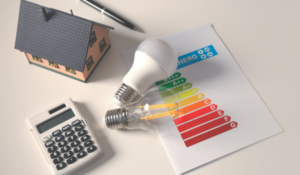
In this article, we explain the difference between the energy price cap and the Energy Price Guarantee as well as how the changes announced by Ofgem will affect your energy bills in the coming months.
What is the energy price cap?
The energy price cap aims to protect UK consumers, ensuring they pay a fair price for their energy. The energy price cap sets out the maximum price that an energy supplier can charge for its standard variable and default energy tariffs. To make things as simple as possible, the energy price cap is expressed as an annual figure, based on the average dual-fuel household bill.
In April 2023 Ofgem announced a 23% reduction to the energy price cap, with it falling from £4,279 to £3,280. The latest energy price cap reduction means that average energy bills will be capped at £2,074 from 1st July 2023.
This means that from July, UK households will no longer have to rely on the Energy Price Guarantee to keep their energy bills down and there could come a point soon where consumers are able to shop around for the best fixed-price energy deals.
The energy price cap is based on the average annual usage of a dual-fuel household. The amount you actually pay for your energy bills will depend on the amount of energy you use.
What is the Energy Price Guarantee?
Introduced on 1st October 2022, the Energy Price Guarantee (EPG) is a Government subsidy that ensures energy prices remain at a certain level for UK households. Similar to the energy price cap, figures are expressed as an annual average and it currently stands at £2,500. The Energy Price Guarantee is set to increase to £3,000 on 1st July 2023, the same day that the energy price cap is set to fall to £2,074, meaning UK households will no longer have to rely on a government subsidy to keep bills down.
What does the energy price cap reduction mean for your energy bills?
Most people should see a reduction in the amount that they pay for their electricity and gas from July this year and this is likely to be further helped by lower usage over the summer months. With consumers currently being subsidised by the Energy Price Guarantee, where energy bills are capped at £2,500, the energy price cap reduction represents a saving of around £450 per year, roughly £40 per month based on an average dual fuel household.
To work out how much you are likely to save, the reduction represents a saving of roughly £8.50 for every £50 you spend on energy. So if your monthly direct debit is set at £150, you should see it reduce by around £25 per month.
The energy price cap reduction is good news for consumers, however, with the £66 per month government support coming to an end in April, most will still be paying more for their energy this summer when compared to last winter.
Energy analysts Cornwall Insight predict that the energy price cap will remain at a similar level until at least April 2024, meaning fixed-price energy tariffs could become attractive once again. Check out our article 'Should I fix my energy prices?' for the latest insight.
Average annual household energy bill 2023
The following graphic highlights what the average dual fuel household can expect to pay for their energy bill in 2023, which is the lower rate between the Energy Price Cap (EPC) and the Energy Price Guarantee (EPG) as shown by the green area in the graph. Remember, however, that prices are capped on unit rates for gas and electricity and you can therefore pay more or less depending on how much energy you use.
What to do if you are struggling to afford your energy bills
If you are struggling to pay your energy bills each month there are a number of things that you can do to try and ease the burden. We list some ways below but additional money-saving tips can be found in our article, 'How to save money on your energy bills'.
- Lower your thermostat - British Gas estimates that turning your thermostat down by 1°C could save you up to £115 per year.
- Use less energy - It goes without saying, but using less energy means you'll spend less on your energy bills. You may also be able to sign up for the Demand Flexibility Service where you get paid for using less energy at set times.
- Speak to your energy supplier - make sure that you notify your energy supplier if you are facing financial difficulty as they will be able to arrange an affordable repayment plan.
- Change over to LED bulbs - LED lightbulbs can save you money when lighting your home as they are more energy efficient.
- Use energy-efficient appliances - appliances with a higher energy efficiency rating are cheaper to run than less efficient appliances and so can help reduce your energy bill.
- Get free debt help and advice - seek help from a number of debt websites and charities.
There are also a whole host of grants and schemes designed for the most vulnerable. For further information and help on the cost of living, check out our 'Cost of Living guide'.